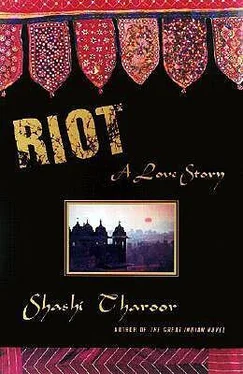Afterwards the air is quiet, and her cheek rests against his chest. He feels his heartbeat in her hand. Into the emptiness of his body floods a great happiness, a tsunami of joy that sweeps away all the debris in his mind, till he is cleansed of everything but the certitude that this is truth, this is right, this is what was meant to be.
“I love you,” she says softly, and his pain is gone.
“Pornography,” Gurinder would say if I showed this to him, which is one more reason I never will. “It’s a fucking blow job, man. You can’t make poetry out of a blow job.” That would be authentic Gurinder. I know, because I’ve tried to talk to him about Priscilla — I had to, not just because I had to talk to someone and he’s my closest friend in Zalilgarh, but because I had to ask him to ensure the cops stayed away from the Kotli when the DM was there.
But I took it too far. I tried to tell him how much Priscilla had begun to matter to me, how I was beginning to think I could not live without her. He was horrified: to him the one thing that matters is our jobs, our noble calling, our role in society. Try telling Gurinder about the power of sexual love. He just doesn’t understand.
“Fuckin’ hell I understand, yaar,” he’d said. “There are ten-rupee rundis on GB Road who’ll give you the same, plus a paan afterwards. Don’t tell me you’re making a philosophy out of that.”
I saw no point in wasting my existential crisis on him. “Bugger off, you philistine” was all I could muster.
“Look, I don’t know what the hell’s got into you, Lakshman. You can fuck the brains out of this blonde for all I care. But don’t let it become so important, yaar. Don’t forget who you are, where you are, what you’re here to do.”
“How can I forget?” I asked, surprising myself with the bitterness in my voice. “How can I possibly forget?”
letter from Priscilla Hart to Cindy Valeriani
August 5, 1989
You know what Guru, the cop here, Lucky’s friend, said to me last night? We were at dinner at Lucky’s place, half a dozen of us, and he’d clearly had too much to drink, but in the middle of a conversation about colonialism he announced, “The Brits came to exploit us, took what they wanted and left, and in the process they changed us.” Then he turned to me quite directly and added, “You come to change us but in the process you also take what you want. Isn’t that just another form of exploitation?”
I was so astonished I didn’t know how to react, but Lucky cleverly made it sound as if Guru was making a general point about foreign nongovernmental aid projects. I wasn’t fooled. I sensed he was trying to convey something quite specific to me, and I burned with shame at the thought that it might be about Lucky.
And yet it couldn’t be, Cin. There’s no way Lucky would betray our secret to anyone. So it must be about my work here. Like so many Indians, Guru’s suspicious of my motives in doing what I do.
What do I want? I want to change the lives of these women, the choices they believe they have. I want to see them one day, these women of Zalilgarh and of a thousand other towns and villages like it in India, standing around the well discussing their own lives and hopes and dreams instead of complaining about their mothers-in- law. I want to hear them not say, with a cross between pride and resignation, “My husband, he wants lots of children,” but rather, “I will decide when I am ready for a child.” I want them, instead of planning to arrange their teenage daughter’s marriage, to insist on sending her to high school. I want all this for them, and that’s why I’m here. Is that exploitation? How can it be exploitation to make women more aware of what they can be?
“Population-control awareness” seems more and more of a misnomer to me. I see myself as trying to make women aware of their reproductive rights, not just to control population but to give them a sense of their rights as a whole, their rights as women. Being forced to have babies is just one more form of oppression, of subjugation by men. I’d rather die than have an abortion myself, but I want to help these women understand that control of their bodies is a rights issue, it’s a health issue, and if they can improve their health and assert their rights, they will have a real future, and they’ll give their daughters a real future. Is this all so difficult to understand, Cin?
And yet, whether Guru meant it or not, I can’t help being conscious of a terrible irony. I care about Indian women in general, and yet I don’t allow myself to think about one Indian woman in particular — Lucky’s wife. I sit at her table and eat her rice and sambar, and I know all along that I am wronging her, that what I want will come at her expense, that Lucky’s and my true love can only hurt her in the end. You’re right, Cin, to remind me of that. And yet, she doesn’t love him, and he doesn’t love her. What he feels is the tug of duty, especially from his little daughter. Sometimes I wonder what would happen if Lucky and I had a daughter, a nut-brown baby with America in her eyes. She’d be so beautiful, Cin. And then Lucky would see me as family….
But at the end of the day, I’m not all that inconsistent, am I? Because my life and my work are both about the same thing. It’s all about women — about our control of our bodies, our right to sleep with the man we choose, with the protection we choose, for an outcome we choose. I want every woman to have that right. Even me.
from transcript of Randy Diggs interview
with Superintendent of Police Gurinder Singh
October 14, 1989
RD: I’ve been interrupting too much. Go ahead and just tell me the story. In your own words. Take your time.
GS: Hell, man, of course I’ll tell it in my own words. Whose damned words do you expect me to use? Look, the police force in those days was stretched almost to the breaking point, like the rubber on a Nirodh, the bloody government-made condom. Ever since the Ram Sila Poojan program had been announced a fortnight earlier, the provincial armed constabulary — we call them the PAC — had been on continuous vigil in the neighboring districts. The riot at Zalilgarh meant that they had to be hastily bundled onto buses and trucks and driven overnight to this frigging town. We immediately deputed them to man every tense enclave. They weren’t a pretty sight, I can tell you, with bloodshot eyes and three days’ growth on their strained faces. It’s a miracle they didn’t start a riot themselves.
Lucky was magnificent. He and I made it a point during our own night-long rounds to stop at each of the PAC pickets. We’d speak to the men about how difficult, and how important, their mission was. And occasionally share with them a hot cup of tea. Our cops weren’t used to the DM-sahib coming to keep their morale up like this. Most of them had never directly spoken to a DM in their frigging lives. As they stood erect and alert at their watch posts, he would pass amongst them, talking to them in his Tamil-inflected Hindi, and the weary faces of the men would light up like Diwali lamps. You know, before the PAC buggers left for the next riot-torn city last week, the DM persuaded the eminent citizens of Zalilgarh to organize a bada khana of thanksgiving for the men. The buggers sat and ate as the city elders served them. Hasn’t happened before, I can tell you.
I don’t want to pretend my policemen are all piss-perfect. Hell, we know they’re not. But when they screw up, we deal with them. The DM received a lot of complaints about excesses committed by the police during the house-to-house searches in the Muslim bastis. We visited some of the houses. It was true. It was as though a frigging cyclone had swept through them. Everything in those houses had been smashed, torn, or burnt by the search teams — the TV and radio, mattresses, furniture, artifacts, everything. An old Muslim woman aged around seventy took off her kameez and salwar to show us deep lathi marks across her body. From the shoulders down to the ankles. I couldn’t bear to look. The DM ordered strong action against the guilty policeman. I ensured that it was taken. Such complaints will not recur on my watch.
Читать дальше












